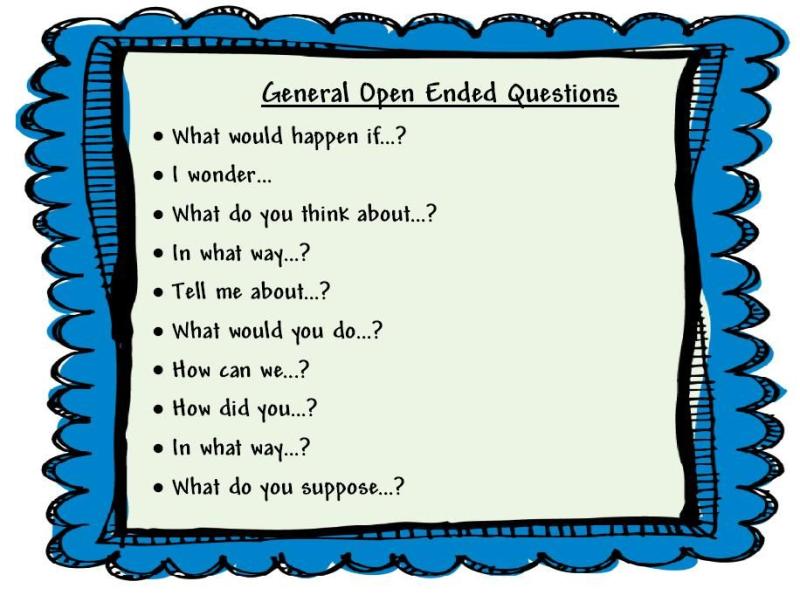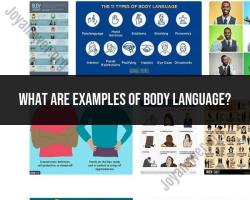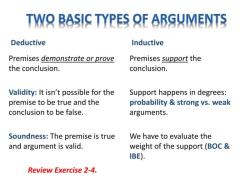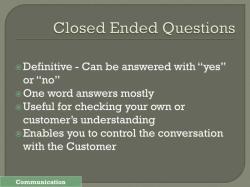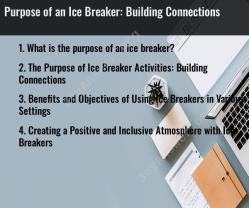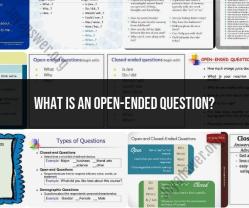How to ask an open-ended question?
Asking open-ended questions involves using language that prompts a more detailed and expansive response, encouraging the person to share their thoughts, feelings, or experiences. Here are some effective methods for asking open-ended questions:
Start with "What," "How," or "Why":
- Begin your question with words like "what," "how," or "why." These words invite the respondent to provide more information. For example:
- "What do you think about...?"
- "How did you feel when...?"
- "Why did you choose to...?"
- Begin your question with words like "what," "how," or "why." These words invite the respondent to provide more information. For example:
Avoid Yes/No Questions:
- Instead of asking questions that can be answered with a simple "yes" or "no," frame your inquiries to encourage elaboration. For example:
- Instead of "Did you enjoy the event?" ask "What aspects of the event did you enjoy?"
- Instead of asking questions that can be answered with a simple "yes" or "no," frame your inquiries to encourage elaboration. For example:
Encourage Descriptions:
- Ask questions that prompt the person to describe their experiences, opinions, or perspectives. For example:
- "Can you describe your approach to...?"
- "What was your experience like when...?"
- "How would you characterize...?"
- Ask questions that prompt the person to describe their experiences, opinions, or perspectives. For example:
Use Thoughtful Phrasing:
- Frame your questions in a way that shows genuine interest and invites reflection. For example:
- "I'm curious about your thoughts on..."
- "Could you share your perspective on...?"
- "I'd love to hear more about your experience with..."
- Frame your questions in a way that shows genuine interest and invites reflection. For example:
Probe for Details:
- If a person provides a brief answer, follow up with a probing question to encourage more depth. For example:
- "That's interesting. Can you give me an example of...?"
- "You mentioned [specific detail]. Could you tell me more about that?"
- If a person provides a brief answer, follow up with a probing question to encourage more depth. For example:
Explore Feelings and Emotions:
- To encourage a more personal response, ask questions that delve into the person's emotions or sentiments. For example:
- "How did you feel when...?"
- "What emotions come up for you when...?"
- "Can you describe the impact this had on your emotions?"
- To encourage a more personal response, ask questions that delve into the person's emotions or sentiments. For example:
Be Patient and Allow Silence:
- After posing an open-ended question, give the person time to gather their thoughts and respond. Sometimes, silence can prompt a more thoughtful and detailed answer.
Tailor Questions to the Context:
- Consider the context of the conversation or situation and tailor your questions accordingly. This helps make your inquiries relevant and engaging.
Remember, the goal of open-ended questions is to foster meaningful and detailed communication. By using language that invites thoughtful responses, you create an environment where people feel encouraged to share more about their experiences and perspectives.
Sure, here is a breakdown of crafting open-ended questions, utilizing them for effective communication, and exploring various forms and techniques:
Crafting open-ended questions: Framing questions that encourage elaboration and discussion
Open-ended questions are designed to elicit elaborate responses, promote deeper understanding, and stimulate meaningful discussions. They typically cannot be answered with a simple "yes" or "no" and require more than a one-word response.
Key Strategies for Crafting Effective Open-Ended Questions:
Start with Open-Ended Phrases: Utilize phrases like "Can you elaborate on," "What are your thoughts on," or "How has this experience influenced" to encourage detailed responses.
Avoid Close-ended Prompts: Refrain from asking questions that can be answered with a simple "yes" or "no." Instead, frame questions that require explanation, justification, or personal reflection.
Employ Wh-Questions: Utilize wh-questions (who, what, when, where, why, how) to initiate open-ended inquiries. These questions encourage elaboration and exploration of different facets of a topic.
Maintain Openness and Neutrality: Formulate questions in a neutral and open manner, avoiding leading the respondent towards a specific answer. Let the respondent's own thoughts and experiences guide their response.
Provide Context and Specificity: Ensure the question is clear and specific, providing enough context for the respondent to understand what is being asked. Avoid vague or overly broad questions.
Avoid Assumptions and Presuppositions: Refrain from framing questions that make assumptions about the respondent's knowledge, beliefs, or experiences. Let the respondent's response reveal their unique perspective.
Utilizing open-ended questions for effective communication: Promoting deeper understanding and engagement
Open-ended questions serve as powerful tools for enhancing communication, promoting deeper understanding, and stimulating meaningful engagement.
Fostering Deeper Understanding: Open-ended questions encourage individuals to explain their thoughts, justifications, and experiences, leading to a deeper comprehension of their perspectives and motivations.
Enhancing Critical Thinking: By requiring elaboration and analysis, open-ended questions promote critical thinking, encouraging individuals to consider various aspects of an issue and form well-reasoned arguments.
Stimulating Meaningful Discussions: Open-ended questions spark engaging conversations, allowing for the exchange of ideas, diverse perspectives, and thoughtful insights.
Building Rapport and Trust: Open-ended questions demonstrate genuine interest in the respondent's thoughts and experiences, fostering rapport and trust in personal and professional relationships.
Examples of open-ended questions: Exploring various forms and techniques for asking open-ended questions
Open-ended questions can be adapted to various contexts and situations, employing diverse forms and techniques.
Seeking Opinions and Perspectives: Ask questions like "What are your thoughts on the recent developments in this field?" or "How has this experience influenced your viewpoint on the issue?"
Encouraging Elaboration and Explanation: Ask questions like "Can you elaborate on the challenges you faced in completing this project?" or "What factors do you consider most important when making a decision?"
Promoting Discussion and Dialogue: Ask questions like "What are your suggestions for improving collaboration within our team?" or "How can we address the concerns raised by stakeholders?"
Understanding Personal Experiences: Ask questions like "What are your aspirations for the future?" or "Can you share a memorable experience that has shaped your life?"
Seeking Explanations and Reasons: Ask questions like "Why did you choose this approach to solving the problem?" or "What motivated you to pursue this career path?"
By mastering the art of crafting effective open-ended questions, individuals can enhance their communication skills, foster deeper understanding, and engage in meaningful interactions across various domains.
